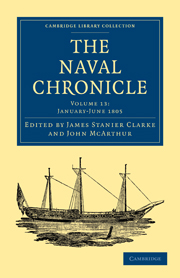 The Naval Chronicle
The Naval Chronicle Published online by Cambridge University Press: 10 January 2011
“The Wedding Guest sate on a stone,
He cannot chuse but hear;
And thus spake on that Ancyent Man
The bright-ey'd Marinere:
Listen Stranger!” ———
(Rime of the Ancyent Marinere.)The following simple Narrative contains the life of a Veteran who, though not altogether successful in his Naval Career, yet has uniformly run with Patience the race that was set before him. It was originally drawn up to gratify the curiosity of a Friend; and it is alone owing to the importunity of friendship, that so correct a delineation of a British Seaman is now presented to the public. May it prove a powerful antidote to the discontent which frequently increases their natural irritability, and overcome that despondency which has sometimes induced Officers to tax their country with ingratitude.
I was born in the City of Edinburgh on the 6th of May, O. S., 1731, and having from my cradle an abhorrence of a sedentary life, I went to sea at the early age of twelve years with my Father, in the Britannia Merchantman fitted out from Leith belonging to the London Trade. After making several voyages both in her and in the Ships James and John, the latter was taken up as a Transport, and ordered with many others to proceed to Aberdeen, under convoy of his Majesty's Ship Fox, of 20 guns, commanded by Capt. Beaver; who was under orders there to embark some Troops that were destined to oppose the progress of the Rebels, already in the vicinity of Edinburgh.
To save this book to your Kindle, first ensure [email protected] is added to your Approved Personal Document E-mail List under your Personal Document Settings on the Manage Your Content and Devices page of your Amazon account. Then enter the ‘name’ part of your Kindle email address below. Find out more about saving to your Kindle.
Note you can select to save to either the @free.kindle.com or @kindle.com variations. ‘@free.kindle.com’ emails are free but can only be saved to your device when it is connected to wi-fi. ‘@kindle.com’ emails can be delivered even when you are not connected to wi-fi, but note that service fees apply.
Find out more about the Kindle Personal Document Service.
To save content items to your account, please confirm that you agree to abide by our usage policies. If this is the first time you use this feature, you will be asked to authorise Cambridge Core to connect with your account. Find out more about saving content to Dropbox.
To save content items to your account, please confirm that you agree to abide by our usage policies. If this is the first time you use this feature, you will be asked to authorise Cambridge Core to connect with your account. Find out more about saving content to Google Drive.